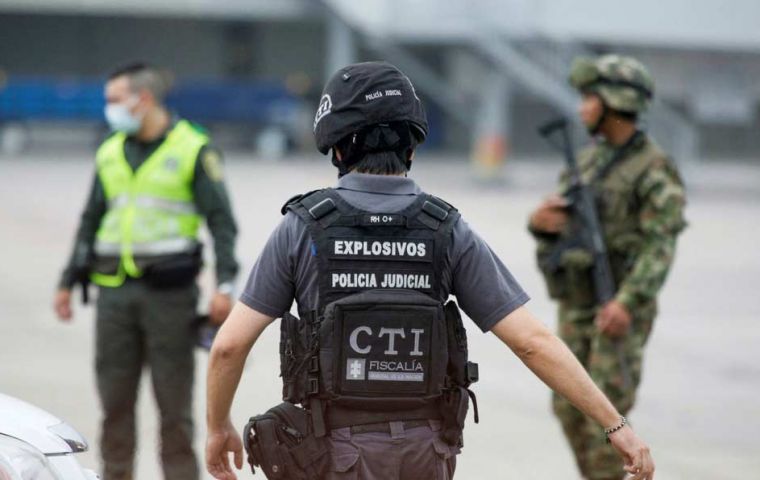MercoPress. South Atlantic News Agency
Explosion at Colombian airport leaves three dead
 President Iván Duque condemned “the cowardly terrorist attack” and promised “to find those responsible for” it (Pic Reuters)
President Iván Duque condemned “the cowardly terrorist attack” and promised “to find those responsible for” it (Pic Reuters) At least three people have been reported dead after an explosion at the Camilo Daza airport in the Colombian city of Cúcuta, near the Venezuelan border.
A man carrying the explosives reportedly ran onto the airport's runway and the detonation ensued, killing the perpetrator, Silvano Serrano, governor of Norte de Santander, told the press.
The other two victims were officers from the bomb squad who were trying to defuse another device inside an abandoned briefcase near the airfield, Serrano added.
Defense Minister Diego Molano said the blasts were caused by “terrorist” groups that operate in the city of half a million people, which is located on the border with Venezuela and is a hub for commerce and migration.
None of the guerrilla or trafficking groups operating in the area has so far claimed responsibility for the attacks.
President Iván Duque condemned “the cowardly terrorist attack” and promised “to find those responsible for” it. “The terrorist attack with explosives at the Camilo Daza airport in Cúcuta claimed the lives of two heroes of our @PoliciaColombia: William Bareño and David Reyes, when they deactivated a second charge in the vicinity of the runway. To their families all solidarity,” wrote Duque on Twitter.
On June 25, the presidential helicopter was attacked by former FARC dissidents at the same airport, with Duque and two of his ministers on board. Two weeks earlier, that same group had activated a car bomb inside a military base in Cúcuta injuring 36 people.
Norte de Santander has recently seen a surge in fighting between guerrilla groups and drug trafficking gangs vying for control of coca crops and trafficking routes. Armed organizations operating in the area include the National Liberation Army and dissident groups formed by former members of the Revolutionary Armed Forces of Colombia who refused to sign the 2016 peace deal with Colombia’s government.




Top Comments
Disclaimer & comment rulesCommenting for this story is now closed.
If you have a Facebook account, become a fan and comment on our Facebook Page!